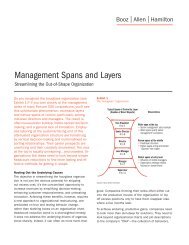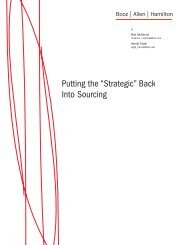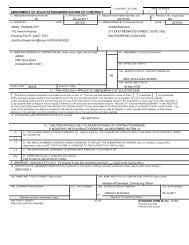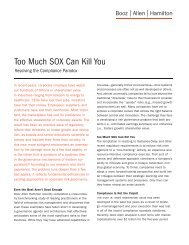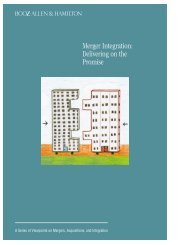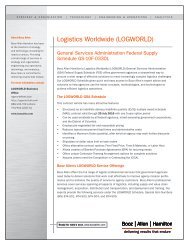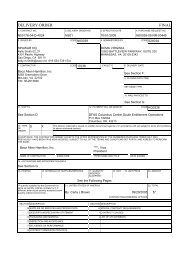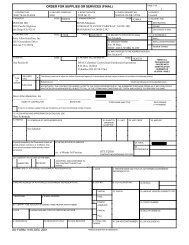Building the Enterprise - Booz Allen Hamilton
Building the Enterprise - Booz Allen Hamilton
Building the Enterprise - Booz Allen Hamilton
- No tags were found...
Create successful ePaper yourself
Turn your PDF publications into a flip-book with our unique Google optimized e-Paper software.
cross-agency goal leaders have managedto make progress even though<strong>the</strong>y have o<strong>the</strong>r major responsibilitiesand no staff support. We can’tchange <strong>the</strong> fact that some enterprisegoal leaders will have o<strong>the</strong>r jobs, but<strong>the</strong>y can be allocated staff to overseeand coordinate <strong>the</strong> portfolio, includingsenior career executives to serveas <strong>the</strong>ir deputies. Without staff support,goal leaders will be at <strong>the</strong>mercy of <strong>the</strong> programs <strong>the</strong>y oversee.That said, we do not advocate <strong>the</strong>allocation of new staff resources tosupport goal leaders. Ra<strong>the</strong>r, staffwould be drawn from <strong>the</strong> managementof <strong>the</strong> portfolio’s constituentprograms.These levers notwithstanding,enterprise goal leaders still willneed to build consensus among <strong>the</strong>agency and program executives in<strong>the</strong>ir portfolios, as well as o<strong>the</strong>r keystakeholders, on common objectives,strategies, performance and outcomemetrics. HUD and DOE tookthat approach in 2009, agreeing onhow <strong>the</strong>y would jointly coordinate<strong>the</strong> use of stimulus funding to improveenergy efficiency of existinghomes. That agreement was documentedin a written memorandumof understanding signed by <strong>the</strong> twoCabinet secretaries, with each department’srole, responsibilitiesand obligations spelled out in detail.Agreeing on mutual expectations, aswell as setting ground rules for makingand enforcing decisions and resolvingdisputes, preempts conflictand makes interagency collaborationfar more likely. As one federalofficial said, it is critical to set up asystem to “communicate, coordinateand compromise.” •STRATEGY 4DEVELOP CAREER ENTERPRISEEXECUTIVES TO LEAD CROSS-CUTTING MISSIONS AND FUNCTIONSThe successful federal enterprisecannot depend on just Cabinet andsub-Cabinet appointees to lead it.To be sure, we expect that <strong>the</strong> presidentwill appoint his most trustedCabinet secretaries and sub-Cabinetofficials to lead presidential prioritiesincluded in <strong>the</strong> enterprise performanceplan. However, <strong>the</strong>re areonly so many of those appointees togo around. If <strong>the</strong> concept of enterpriseis ever to get to scale, career“Senior career executivesmust be developed with anenterprise perspective and<strong>the</strong> ability to demonstrate <strong>the</strong>enterprise leadership skills.”executives will have to be utilized.Some may be called upon to serveas <strong>the</strong> day-to-day deputies of Cabinet-levelgoal leaders, whose officialresponsibilities preclude full-timefocus. O<strong>the</strong>r career executives maybe asked to do even more, taking directcharge of cross-cutting missionareas and support functions.Are today’s career executivesup to it? <strong>Enterprise</strong> executives, withinteragency experience and government-widefocus, are exactly whathad been envisioned when <strong>the</strong> federalSenior Executive Service (SES)was created 35 years ago. However,that vision has never become a reality.With few exceptions, today’ssenior executives are agency-centricin experience and orientation, as organizationallystovepiped as <strong>the</strong> government<strong>the</strong>y serve. Most have remainedin <strong>the</strong> same agency for <strong>the</strong>irentire careers, promoted for <strong>the</strong>irtechnical skills and never movedacross or out of that organization tobroaden <strong>the</strong>ir experience or expertise.The result: Few are equipped tolead <strong>the</strong> enterprise.This must change if <strong>the</strong> conceptof enterprise is to succeed. Seniorcareer executives must be developedwith an enterprise perspectiveand <strong>the</strong> ability to demonstrate <strong>the</strong>enterprise leadership skills enumeratedearlier. This development mustbegin before senior executive statusis awarded. The intelligence agenciesoffer an example. Following <strong>the</strong>tragedy of 9/11 and revelations about<strong>the</strong> lack of communication among<strong>the</strong> intelligence agencies, <strong>the</strong> communitynow requires all executivecandidates to complete one or moreinteragency assignments of at least ayear in duration, as well as specifictraining in interagency leadershipbefore <strong>the</strong>y can be promoted to se-14 PARTNERSHIP FOR PUBLIC SERVICE | BOOZ ALLEN HAMILTON



